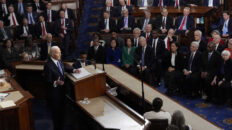Now that the special election is over, the mainstream press can stop reporting on Alabama as if it were Mars. Have some sympathy with the voters in this state, please. Not for the first time, a populist demagogue snagged the Republican nomination. His opponent had all the predictable views of the Democrats, which is to say similarly attached to an old-world model of political control.
Those who held their nose and voted for the Republican didn’t like his antics or views; they simply observed that once these people take office, they aren’t even real people with much decision-making power. They just become part of one of two tribes that compete and cooperate to rule everyone in arbitrary ways. Choosing between the tribes is a strange calculation based on value primacy, life priority, and calculation concerning the least-dangerous threat.
The left is getting nuttier, the hard right is getting scarier, and the entire enterprise of political control seems ever more outmoded. The Alabama case provided no good option for people. It’s no one’s fault in particular that this happens. We’ve all been here before, as recently as the 2016 presidential election. This problem has been building for decades and is likely to get worse, as the fanatics who inhabit these realms become ever more intense.
The left is getting nuttier, the hard right is getting scarier, and the entire enterprise of political control seems ever more outmoded. Over the last century, we’ve seen these gigantic government institutions with hegemonic power. All that remains is the struggle for who gets to control them and these elections are the public vehicle we’ve traditionally relied upon to render a decision.
It was once believed that mass elections like this would bring peaceful outcomes to the struggle. Not so any more. It only pushes the conflicts into the future. The seething over the results begins as soon as they are announced, and the cries for revenge follow in short order. It is particularly dangerous when the results track racial and gender demographics so closely, inviting everyone involved to regard his or her neighbor as an enemy.
This winner of this election declared that his victory had united the state. That’s absurd. The losers will be madder than ever and swear that they too will have their day.
Direct Elections
It’s a decent time to remember that under the original US Constitution, the Senate was not supposed to be decided by a people’s vote. The Senate was appointed by state legislators. The idea was to temper the populism of the House of Representatives, ensure that every state had solid representation as a regional government, and provide some stability to foil democratic upheaval.
Then the Progressive Era came along, with its near-religious attachment to voting as a means of decision making, its aspiration for a unity state, and its distrust of constitutional restraint on the powers of the federal government. In 1913, the 17th amendment of the US Constitution was ratified. The stated intention was to eliminate perceived corruption and legislative deadlocks.
Sure enough, it did end some deadlocks, enabling an expansion of government power that would not have otherwise been possible. It also fundamentally changed the structure and political dynamic of Congress itself. The devolved structure of American government was upended and political rights of the states declined. The Senate became another version of the House, directly elected and thereby subject to the same demagoguery, factionalism, and demographic recrimination that characterized elections for the House.
Indeed, the struggle never ends, but it really should.
If you understand something of the times in which this amendment passed, you can discern the whole motivation: unleash centralized power to lord it over the whole nation, without the limiting factors of the stodgy, regionally attached, and power jealous Senate filled with people who actually believed in the idea of federalism.
It was all of a piece: the creation of the Federal Reserve, the legalization of income taxation at the federal level, and the direct election of the Senate. It was a triple blow to the original constitutional structure designed to limit government power.
Alabama Decided Nothing
The morning after the amazing display of the special elections, we are being told precisely what the voters decided in Alabama. In fact, the voters as a whole decided nothing. And President Trump, who thrives on conflict above all else, tweeted the point. “The Republicans will have another shot at this seat in a very short period of time. It never ends!”
Indeed, the struggle never ends, but it really should. It’s hard to imagine who precisely benefits from these frenzies besides the rulers who gather the spoils from this bloodsport. And part of doing that is to render all results in absolutist terms: this person won and this person lost. But that’s just a numbers game, and heavily influenced by voter turnout.
In reality, the voting decision is taken on the margin. You very likely vote for someone not because you like him or her but because you fear the alternative even more. When elections become polarized, the hard core begin to rally as if losing were an existential threat. The sound bites become short, the talking points more incendiary, and the incentive to lie and smear rises.
This election served as a very public reminder (as if you needed one) that politics has become as preposterous as it is dangerous. What’s so frustrating about these election spectacles is that they have nothing to do with creating the good life. For that we have to look elsewhere, such as the newly emerging light we are seeing on the economic horizon. For the first time in decades, there is a chance that the job market is becoming active again, that incomes will rise, that inflation is solidly tamed, that the young generation will have new opportunities, that new products and inventions will continue to improve our lives.
None of this has anything to do with smears, epic struggles, revenge fantasies, and winner-take-all scenarios. The prospect of an improved economic environment is due to market forces that are gradually crawling out from under the burdens of bureaucracy, taxation, and regulatory strangulation that has characterized the work of government in all living memory. If we follow this light far enough, we can see a better way toward social and economic organization, one that relies on the voluntary means rather than the impositions of government power whether elected or unelected.
This election served as a very public reminder (as if you needed one) that politics has become as preposterous as it is dangerous, the prospect of ruling other people will always attract manipulative psychopaths, and government as we know it is a truly terrible way to order society.
This article originally appeared on FEE.














Add comment